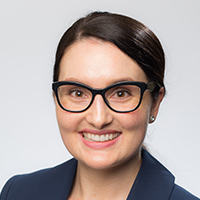Jade Roberts joined Melbourne Law School as a Research Fellow in August 2018. She is a PhD Candidate and a Teaching Fellow from 2020-2021 and her research and teaching focuses on international law, statelessness, forced displacement and human rights.
Jade has a Bachelor of Laws and a Bachelor of Arts with majors in Political Science and International Relations and Anthropology and Sociology from the University of Western Australia (UWA), where she was a UWA Fogarty Foundation Scholar. She has a Graduate Diploma in Legal Practice, is admitted as a solicitor in Victoria and has worked in the Social Justice Practice of Shine Lawyers.
Jade also has a Graduate Diploma in Australian Migration Law and Practice and served as a Registered Migration Agent assisting asylum seekers apply for protection with The Humanitarian Group and the Southern Communities Advocacy Legal and Education Service, two community law centres in Western Australia.
Jade has a Master’s in International Law from the Graduate Institute of International and Development Studies in Geneva and her master’s thesis examined how international law can better respond to the problem of environmental displacement. She has lectured in international human rights law in Geneva with Murdoch University and has worked as an English language teacher, and she holds a Certificate in English Language Teaching to Adults.
Prior to joining Melbourne Law School, Jade worked in research roles with the Global Migration Centre, the Internal Displacement Monitoring Centre and the Office of the High Commissioner for Human Rights in Geneva. From 2018 she was a Research Fellow with the ARC Discovery Project ‘Freedom and Inclusion in the Modern University’ with Professors Adrienne Stone and Carolyn Evans, culminating in the publication of Open Minds: Academic Freedom and Freedom of Speech in Australian Universities (La Trobe University Press/Black Inc Books 2021).
Jade also works on research projects with the Peter McMullin Centre on Statelessness and is a managing editor of the Statelessness and Citizenship Review. Her PhD research examines alternative approaches to understanding and addressing statelessness in international law.
Thesis Title
Beyond the State: Alternative Approaches to Statelessness in International Law
Thesis Summary
For the more than 4.3 million stateless people worldwide, being without a nationality often equates to a lack of access to human rights. The current approach to addressing statelessness, reflected in the UNHCR Global Action Plan to End Statelessness by 2024, views statelessness as a problem to be solved by states through the grant of nationality. However, this approach has several problems, including a lack of political will among states to end statelessness. This thesis seeks to broaden the dominant understanding of statelessness by considering alternative approaches. It explores whether alternative forms of citizenship – such as those offered by cities or regional organisations or through international law – could remedy the rights deprivations that stateless people experience. In doing so, it aims to not only contribute to understandings of statelessness, but to shed light on the relationship between individuals and states in international law.
Supervisors
- Statelessness
- Refugee Law
- Migration Law
- Legal Theory
- Human Rights Law
- Academic Freedom
